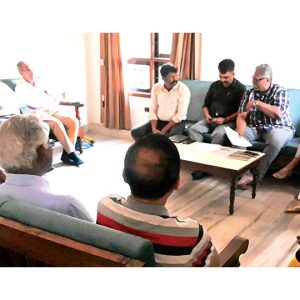Mysuru: The District Administration is on an overdrive combating the rise in dengue and other viral diseases in the district including the city. They are leaving no stone unturned to battle the fear that has gripped the people about the rising viral fever cases.
In response to this, the District Health and Family Welfare Department, this morning launched an additional nine Rapid Response team to the already existing three teams since two years, at the District Health Office premises, Nazarbad. In all, there are 18 such teams in the District.
DHO Dr. B. Basavaraju speaking after the launch said that there are 11 to 15 members in each team that consist of a Medical Officer, ASHA Workers and Nurses from Primary Health Centres. Each team visits houses individually to create awareness as to how and why dengue, Chikungunya, Malaria and other viral diseases spread and how to control them.
According to Dr. Basavaraju, the water collected in buckets for more than two days should be thrown out as the larvae of the Aedes Mosquitoes get collected in such stagnant water. Apart from this, the larvae would be found in air conditioners and even in flower vases.
The spread of diseases is not only found in areas like Rajiv Nagar, Ghousia Nagar, N.R. Mohalla, Shanti Nagar, JP Nagar but also in other residential areas like Saraswathipuram, Lakshmipuram, Kuvempunagar, Jayalakshmipuram, he said and added that due to scanty rainfall this year the aedes mosquito larva are thriving. Otherwise, it would be washed away in the heavy rains.
The three Rapid Response teams had visited two lakh houses in the last two years and with the addition of nine more teams this time, it is a continuous process to create awareness, said Dr. Basavaraju.
On Saturday, DC D. Randeep, Corporation Commissioner G. Jagadeesha and DHO Dr. Basavaraju had visited Shantinagar and surrounding areas and distributed pamphlets. They had found that though the surroundings were clean there was larva found in the stagnant water in houses, which was brought to the notice of the residents.
District Vector Borne Diseases Control Officer Dr. Chidambara who had given training to the members of the Rapid Response teams said that the health workers were drawn from PHCs in rural areas for assistance to meet the crisis. They will visit each house and create awareness among the residents.
He said that unlike in rural areas where the people co-operate, the people in urban areas have a tendency to neglect. If there is more larva found in public places, the Response team has been asked to take photographs so that it will be brought to the notice of the Corporation for taking action. Family Planning Officer Dr. Siraj, District Surveillance Officer Dr. Kusuma and others were present.








Recent Comments